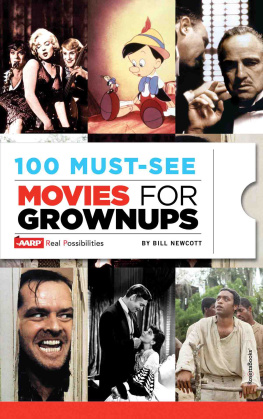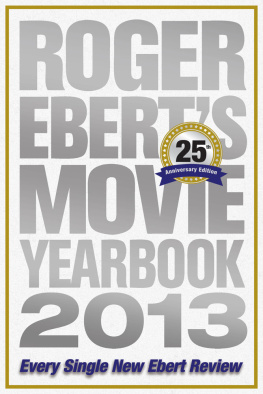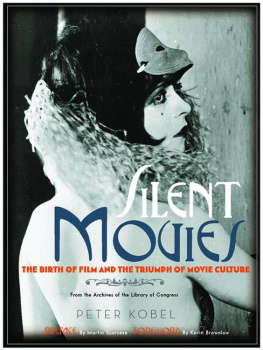Five Stars!
How to Become a Film Critic, the Worlds Greatest Job
SECOND EDITION
by Christopher Null
Published by:
Christopher Null at Smashwords
Copyright (c) 2005-2012 by Christopher Null
ISBN (Ebook edition): 978-0-9720981-2-0
All rights reserved. Without limiting the rights under copyright reserved above, no part of this publication may be reproduced, stored in or introduced into a retrieval system, or transmitted, in any form, or by any means (electronic, mechanical, photocopying, recording, or otherwise) without the prior written permission of both the copyright owner and the above publisher of this book.
Smashwords Edition Licence Notes
This ebook is licensed for your personal enjoyment only. This ebook may not be re-sold or given away to other people. If you would like to share this book with another person, please purchase an additional copy for each person you share it with. If youre reading this book and did not purchase it, or it was not purchased for your use only, then please return to Smashwords.com and purchase your own copy.
For the Film Racket gang
Published by Sutro Press, San Francisco, California.
www.sutropress.com
Also by Christopher Null
Half Mast: A Novel
Foreword to the Second Edition
It astounds me how different the market for film criticism is today than it was just eight years ago, when the first edition of Five Stars! was printed. Everyone has a blog, and regional newspapers have begun to open their doors to anyone who wants to write about movies, in a sort of unofficial capacity that trades a byline and a couple of free movie tickets for a few hundred words about the big release of the week. If you want to write about movies, theres no shortage of avenues for you now. Even Twitter is a viable medium for reviews, and its one that the studios take incredibly seriously. (In addition to admonishing writers from publishing reviews ahead of opening day, screening invitations now regularly discourage pre-release tweets, too.)
And yet, after all these years, I continue to be inundated with email from hopeful writers who want to be the next Roger Ebert. How do I break into the business? How do I see movies in advance? How do I write reviews?
Well, the good news is that not everything has changed, and the guidelines and tips on how to write a readable, entertaining, and informative movie review are just as valid today as they were in 2005, and Ive referred thousands of readers to the first edition of the book.
That said, Ive known for some time that Five Stars! Has been due for an update. Many of the studios in the listings section have changed hands or gone out of business, and there has been nearly a decade of technological and artistic advances in Hollywood that need to be recognized. 3D, for example, was a forgotten joke at the turn of the century. Now you cant go to the movies without someone handing you a pair of special glasses.
What follows is a revised and refreshed version of the book that I hope will be more relevant than ever to new and old readers, and which remains the only serious book on the market designed to teach novices the art and science of reviewing movies. Much of the content remains the same, but many sections have been updated, most notably many of the sample movie reviews, updated to reflect newer releases. The appendix, 300 Must-See Films for the Aspiring Critic, has also been updated to reflect some new essentials released in the last eight years.
Whether youre picking up this book for the first time or are returning to it after a hiatus, I hope, as always, you find it useful in your quest to become a film critic or, if the tactics outlined in the first edition already worked out for you, to become an even better one.
And lastly, please check out my new movie website, Film Racket, at www.filmracket.com.
Christopher Null
February 2013
Preface
So you want to be a film critic?
Do you see every movie that hits your local multiplex? Are you the office gossip when it comes to celebrity weddings and breakups? Or maybe you just love to riff Monty Python lines with the guy in the cubicle next door.
Or maybe you just really love the movies.
While all of these traits are great, none of them are what being a film critic is really about.
To become a great critic, you need the following characteristics, in this order:
You have seen a ton of movies and are able to separate them into good and bad. (If you love every movie you see or even most of them, you arent cut out for this line of work.)
You have the ability to write well.
You have the time and inclination to watch and review five or more films a week. (At my peak output I reviewed at least one movie every day. In the past Ive reviewed up to four in a day.)
Finally, you need an outlet for publishing your work.
This book will help you develop all of these.
In Chapters 2 and 3, youll learn a bit about filmmaking and film history. In the appendix, youll find recommended homework to help get you up to speed on any classic and not-so-classic films you might have missed.
In Chapters 4 through 7, youll learn how to construct a movie review and how to approach different styles of entertainment writing, including celebrity interviews.
Finally, Chapter 1 and Chapters 8 through 10 will help you find a place to publish your work (or create one of your own). Chapters 11 through 15 discuss how to get access to screenings, and etiquette once you are there. Also, these chapters provide other support materials for the aspiring critic. Ill even try to throw in some advice about finding time to see all these movies throughout the book.
I hope you enjoy the book, and I hope it aids you in your quest to become a feature film critic. I love to hear from readers and look forward to working with some of you in the future. Ive tried to create a book that answers every question you might have about becoming a film critic and mastering the trade. If Ive overlooked something, or if you have any other comments about the text, please drop me a line.
Christopher Null
Chapter 1: The Market for Film Criticism.
I am the first to admit there is something absurd about film criticism.
Here is a person who saw the same movie as everyone else, and just because he puts pen to paper, his thoughts are somehow more valid than yours? Familiar names like Roger Ebert and Pauline Kael somehow give an opinion about movies more weight. Its ridiculous. How does a critic know if youre going to like a movie or not?
So why do critics exist? Because they strive to entertain us and enlighten us with their commentary about the movies. When we find a critic we often agree with, we find someone who can help us connect with entertainment we would otherwise miss. We also avoid costly mistakes by skipping movies that look good on paper but which stink in reality.
Is film criticism art, as Kael liked to think? Depends on who you ask and what you read. There are critics who strive merely to entertain us with jokes, using a fictitious byline and broad humor in their writing, telling us little about the actual film. There are those that deeply analyze a movie, craft thoughtful prose, and place movies in a societal context, but without any entertainment value. And there are those rare critics who do both. This is when criticism becomes an art form on par with the movies themselves.
So does film criticism matter? That is, does the opinion of a film critic have any effect on the success or failure of a film?
Movie stars, directors, and producers are fond of bashing film critics, labeling them as trolls and bottom-feeders riding on their celebrity. When a badly-reviewed movie performs well in theaters, Hollywood laughs off film critics as powerless and ridiculous wastes of time, out of touch with the preferences of mainstream America. Fair enough: Many critics are elitists, sure, but most of us are just tired of seeing bad movies we want to open peoples eyes to the real gems of cinema.
Next page




